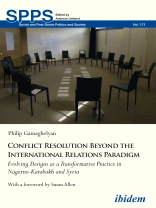Conflict Resolution holds the promise of freeing approaches and policies with regard to politics of identity from the fatalistic grip of realism. While the conceptual literature on identity and conflicts has moved in this alternative direction, conflict resolution practice continues to rely on realist frames and acts as an unwanted auxiliary to traditional International Relations (IR). Perpetuation of conflict discourses, marginalization, and exclusion of affected populations are widespread. They are caused by the over-reliance of conflict resolution practice on the binary frames of classic IR paradigms and also by the competitive and hierarchical relationships within the field itself.
Philip Gamaghelyan relies on participatory action research (PAR) and collective auto-ethnography to expose patterns of exclusion and marginalization as well as the paradoxical reproduction of conflict-promoting frames in current conflict-resolution practice applied to the Nagorno-Karabakh and Syrian crises. He builds on the work of post-modernist scholars, on reflective practice, and on discourse analysis to explore alternative and inclusive strategies with a transformative potential through reflections and actions customary for PAR.
The IR discipline, that has dominated policy-making, is only one possible lens, and often a deficient one, for defining, preventing, or resolving contemporary conflicts wrapped in identity politics. Other conceptual frameworks can help to rethink our understanding of identity and conflicts and reconstruct them as performative and not static phenomena. These transformative frameworks are increasingly influential in the conflict resolution field and can be applied to policy-making.
关于作者
Philip Gamaghelyan teaches at Georgetown University at Washington, DC. He is also director of programs at the Imagine Center for Conflict Transformation and managing editor of Caucasus Edition (www.caucasusedition.net). Gamaghelyan studied French, political science, inter-communal coexistence, and conflict resolution at Yerevan State University of Languages and Social Sciences, Brandeis University, and George Mason University. His papers have appeared in International Negotiation, Turkish Policy Quarterly, Peace and Conflict Monitor, among others.












